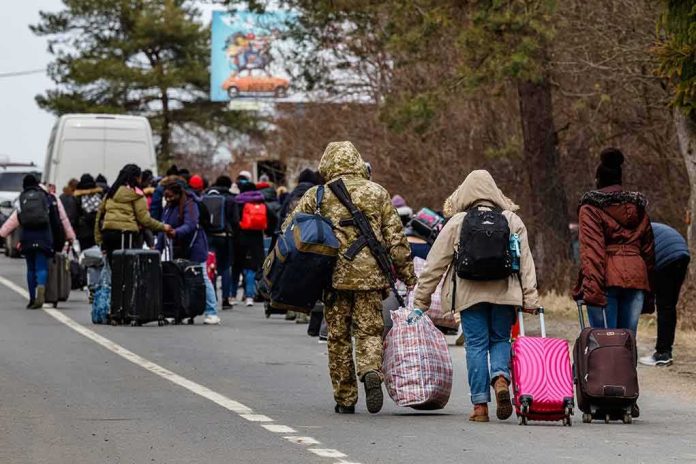
Millions of Americans may soon witness their dinner tables shrink as refugees become the first casualties of federal food stamp cuts—a chilling preview of what the One Big Beautiful Bill Act could mean for the most vulnerable across the country.
Story Highlights
- Refugees are targeted first for food stamp reductions under new federal budget law.
- The One Big Beautiful Bill Act signals wider upheaval for national food assistance programs.
- Communities brace for increased hunger and instability as benefits evaporate.
- Political and social debates intensify over who deserves help—and who is left behind.
Refugee Families Face Immediate Threat to Food Security
Federal policymakers have trained their focus on refugees, carving them out as the first group to lose access to critical food assistance. The new budget measure, championed by Republican lawmakers under the One Big Beautiful Bill Act, slashes funds specifically allocated for refugee food stamps. The move triggers anxiety among families who arrived in America seeking safety, only to confront the prospect of empty pantries and uncertain futures. Advocacy organizations warn that the abrupt change will leave thousands scrambling to afford basic groceries, testing the nation’s promise to shelter those fleeing conflict and persecution.
Legislators supporting the cuts assert that the measure restores fiscal discipline and prioritizes “deserving” recipients. Critics counter that the targeting of refugees sets a dangerous precedent, potentially opening the floodgates for deeper reductions affecting millions more. Local food banks and charities anticipate surging demand as refugees lose government support, stretching already strained resources. Community leaders highlight that the ripple effect will impact not only refugees but also broader neighborhoods, threatening social cohesion and public health.
The One Big Beautiful Bill Act: A Paradigm Shift in Welfare Policy
The One Big Beautiful Bill Act marks a dramatic shift in federal welfare policy, reshaping the landscape of assistance for the poorest Americans. While the immediate impact falls on refugees, the bill’s structure suggests a larger strategy: incremental tightening of eligibility and benefits for many categories of recipients. Analysts interpret the act as a signal that lawmakers will continue scrutinizing—and potentially restricting—access to safety-net programs. The language of the bill frames food stamps as a “privilege” rather than a right, fueling debate over the moral and economic rationale behind such cuts.
Opponents argue that the act undermines the foundational values of American humanitarianism. They cite historical precedents where restricting aid led to waves of hardship, malnutrition, and social unrest. Supporters of the bill, meanwhile, emphasize the urgency of reducing federal spending and incentivizing self-sufficiency. The clash exposes deep divisions in national priorities, with each side invoking the specter of either fiscal collapse or ethical failure. The political calculus behind the bill leaves open the question: Who decides whose hunger matters?
Survival, Uncertainty, and a Test of American Ideals
Refugees now find themselves navigating a daily minefield of survival decisions, from stretching food budgets to seeking alternative sources of support. Families recount stories of skipping meals, rationing supplies, and relying on informal networks for help. The immediate loss of food stamps translates into tangible health risks, especially for children and seniors. Social service providers report rising anxiety and depression among affected populations, compounding the physical realities of hunger with psychological distress.
Broader American society faces a reckoning as the implications of the bill unfold. The refugee experience serves as a harbinger for millions whose benefits may also be on the chopping block. Public opinion remains sharply divided, with some Americans expressing frustration over perceived abuses of the welfare system, while others rally to protect the vulnerable from political crossfire. The national conversation now pivots on the question of responsibility: What does it mean to uphold communal values when resources grow scarce and decisions become zero-sum?
Sources:
Refugees will be among the first to lose food stamps under federal changes







